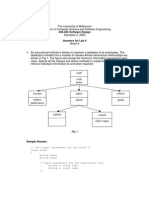0 ratings0% found this document useful (0 votes)
4 viewsJavaLabassign4
The document contains a Java program that defines a class hierarchy for managing information about persons, specifically professors and students. It allows for input of personal data, including name, age, publications for professors, and marks for students, and outputs this data along with a unique ID. The program utilizes inheritance and encapsulation principles in object-oriented programming.
Uploaded by
NIKLAUSCopyright
© © All Rights Reserved
We take content rights seriously. If you suspect this is your content, claim it here.
Available Formats
Download as PDF, TXT or read online on Scribd
0 ratings0% found this document useful (0 votes)
4 viewsJavaLabassign4
The document contains a Java program that defines a class hierarchy for managing information about persons, specifically professors and students. It allows for input of personal data, including name, age, publications for professors, and marks for students, and outputs this data along with a unique ID. The program utilizes inheritance and encapsulation principles in object-oriented programming.
Uploaded by
NIKLAUSCopyright
© © All Rights Reserved
We take content rights seriously. If you suspect this is your content, claim it here.
Available Formats
Download as PDF, TXT or read online on Scribd
You are on page 1/ 3
Name: B.
Latha Sagar
RegNo: 12204652
Roll No: 42
Section: D2212
Course Code: CAP680
source code:
import java.util.Scanner;
class Person {
protected String name;
protected int age;
static int cur_id;
public Person() {
cur_id++;
}
public void getdata() {
Scanner sc = new Scanner(System.in);
System.out.print("Enter name: ");
this.name = sc.nextLine();
System.out.print("Enter age: ");
this.age = sc.nextInt();
}
public void putdata() {
System.out.println("Name: " + this.name);
System.out.println("Age: " + this.age);
}
}
class Professor extends Person {
private int publications;
public Professor() {
super();
}
public void getdata() {
super.getdata();
Scanner sc = new Scanner(System.in);
System.out.print("Enter publications: ");
this.publications = sc.nextInt();
}
public void putdata() {
super.putdata();
System.out.println("Publications: " + this.publications);
System.out.println("ID: " + cur_id);
}
}
class Student extends Person {
private int[] marks = new int[6];
public Student() {
super();
}
public void getdata() {
super.getdata();
Scanner sc = new Scanner(System.in);
System.out.print("Enter marks in 6 subjects: ");
for (int i = 0; i < 6; i++) {
marks[i] = sc.nextInt();
}
}
public void putdata() {
super.putdata();
int sum = 0;
for (int i = 0; i < 6; i++) {
sum += marks[i];
}
System.out.println("Total marks: " + sum);
System.out.println("ID: " + cur_id);
}
}
public class Main {
public static void main(String[] args) {
Scanner sc = new Scanner(System.in);
System.out.print("Enter the number of professors: ");
int n = sc.nextInt();
Professor[] professors = new Professor[n];
for (int i = 0; i < n; i++) {
professors[i] = new Professor();
professors[i].getdata();
}
System.out.print("Enter the number of students: ");
n = sc.nextInt();
Student[] students = new Student[n];
for (int i = 0; i < n; i++) {
students[i] = new Student();
students[i].getdata();
}
for (Professor professor : professors) {
professor.putdata();
}
for (Student student : students) {
student.putdata();
}
}
}
Output:
You might also like
- Yr 9 PASS The Body in Action PowerpointNo ratings yetYr 9 PASS The Body in Action Powerpoint77 pages
- Name: Mohamad Fasil Ansaary M Reg. No.: 19BCE1687 Course: CSE1007 Java Programming Lab Faculty: Dr. Hema NNo ratings yetName: Mohamad Fasil Ansaary M Reg. No.: 19BCE1687 Course: CSE1007 Java Programming Lab Faculty: Dr. Hema N8 pages
- Programming 2 Section 7 OOP (Encapsolation &inestractor)No ratings yetProgramming 2 Section 7 OOP (Encapsolation &inestractor)15 pages
- Import Import Import Class Private Private Private Private Int Public Super This NewNo ratings yetImport Import Import Class Private Private Private Private Int Public Super This New9 pages
- Lab7 (Dealing With Polymorphism and Inheritance)No ratings yetLab7 (Dealing With Polymorphism and Inheritance)18 pages
- Department of Computer Science & Engineering: Jubail University CollegeNo ratings yetDepartment of Computer Science & Engineering: Jubail University College5 pages
- Student Management System – CRUD operations for students, courses, and gradesNo ratings yetStudent Management System – CRUD operations for students, courses, and grades3 pages
- BCSP241006_AYESHA_ZAFAR_TPL_ASSIGNMENT_03No ratings yetBCSP241006_AYESHA_ZAFAR_TPL_ASSIGNMENT_037 pages
- Q.1 Write A Java Program To Demonstrate The Use of Inheritance. AlgorithmNo ratings yetQ.1 Write A Java Program To Demonstrate The Use of Inheritance. Algorithm11 pages
- Write A Program To Demonstrate Use of Implementing InterfacesNo ratings yetWrite A Program To Demonstrate Use of Implementing Interfaces14 pages
- Example of Array List Using Object Stud With Data Type StudentNo ratings yetExample of Array List Using Object Stud With Data Type Student3 pages
- Revolutionizing Travel with Cutting-Edge Web TechnologiesNo ratings yetRevolutionizing Travel with Cutting-Edge Web Technologies12 pages
- XD Innovation Announces New 3DEXPERIENCE Packages For Small & Medium Aerospace SuppliersNo ratings yetXD Innovation Announces New 3DEXPERIENCE Packages For Small & Medium Aerospace Suppliers3 pages
- Invest Your Money SAFELY in These Assets, DESPITE A Volatile Market Akshat Shrivastava - YouTubeNo ratings yetInvest Your Money SAFELY in These Assets, DESPITE A Volatile Market Akshat Shrivastava - YouTube1 page
- Advanced Bridge Defense: Eddie Kantar TeachesNo ratings yetAdvanced Bridge Defense: Eddie Kantar Teaches241 pages
- MIM Academic Year 2019/2020 Exam Sample Questions MM03 - Data-Driven Marketing Professors Blasco-Arcas, Lee, Macé, Maggioni, WilkenNo ratings yetMIM Academic Year 2019/2020 Exam Sample Questions MM03 - Data-Driven Marketing Professors Blasco-Arcas, Lee, Macé, Maggioni, Wilken7 pages
- Science7 Q4 Module4 RiseAboveSinkBelowBlowAroundNo ratings yetScience7 Q4 Module4 RiseAboveSinkBelowBlowAround33 pages
- Psychoanalytic Psychology of The Self and Literature0% (1)Psychoanalytic Psychology of The Self and Literature21 pages
- Zenex AR 23-24 - Non Stat Revised 231024 - 10 CommentsNo ratings yetZenex AR 23-24 - Non Stat Revised 231024 - 10 Comments48 pages
- Beyer 1937 Chichen Inscriptions CompleteNo ratings yetBeyer 1937 Chichen Inscriptions Complete146 pages
- FPC Fresh Awards Guest List Programme FINAL 15.09.2022No ratings yetFPC Fresh Awards Guest List Programme FINAL 15.09.202217 pages
- Strictly Private & Confidential: (Insert Name of The Company)No ratings yetStrictly Private & Confidential: (Insert Name of The Company)5 pages
- Download Full Microwave Integrated Circuit Components Design through MATLAB 1st Edition S Raghavan (Author) PDF All Chapters100% (14)Download Full Microwave Integrated Circuit Components Design through MATLAB 1st Edition S Raghavan (Author) PDF All Chapters85 pages
- The Development of Magazines in Vietnam?No ratings yetThe Development of Magazines in Vietnam?7 pages


































































































